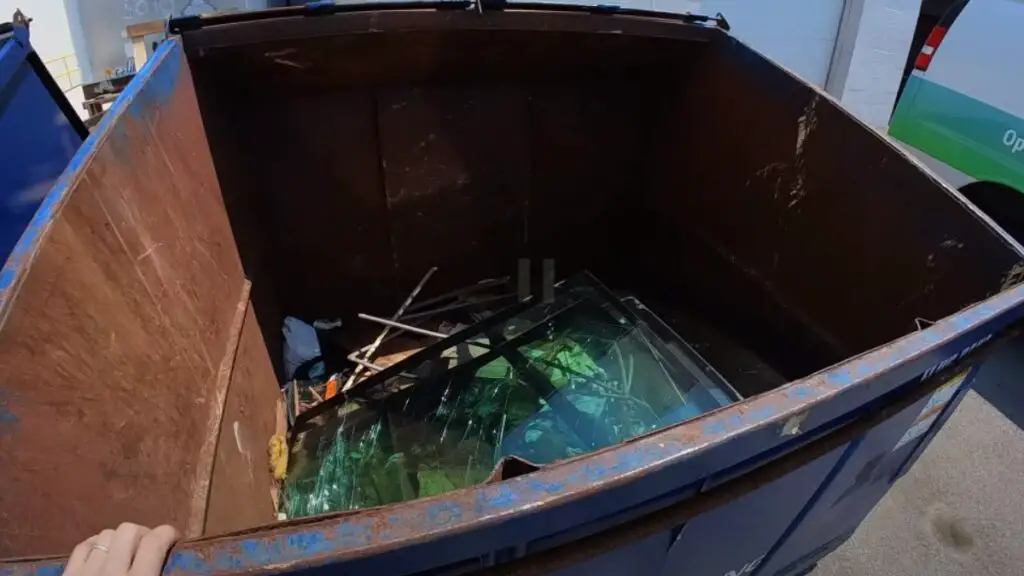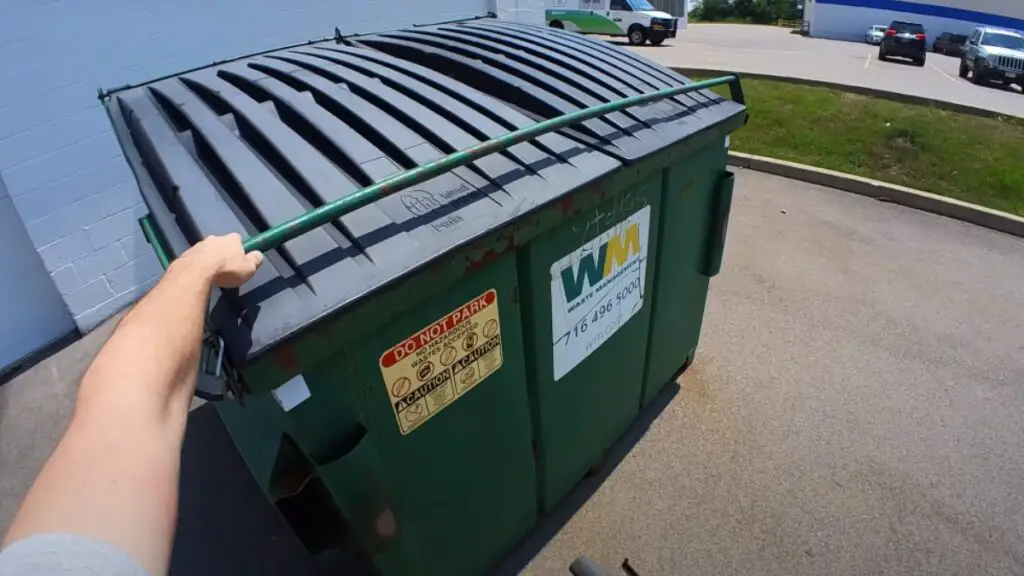If you’re a person who looks at the treasures in the dumpsters while others see them like garbage, then this article is for you.
We will explore the laws and the treasures in Montana together. Usually, Montana is known for its landscape, but it also throws away tons of waste every year.
In this article, we will dive into whether dumpster diving is legal and how much potential there is in diving in Montana.
Dumpster Diving In Montana

Dumpster diving, done in a recreational and necessity-driven context, has been impacted by the state’s population of just over 1 million.
Notably, Montana’s vast landscape, over 147,000 square miles, often results in substantial distances between homes and waste disposal facilities, which influences the variety and volume of discarded items.
It’s estimated that Montanans produce approximately 1.5 million tons of waste annually, a significant portion of which is potentially reusable material.
Consequently, dumpster diving in this region can unveil an array of overlooked treasures, from furnishings and appliances to clothing and collectibles.
Is It Legal To Dumpster Diving In Montana?
In Montana, there is no state-wide law that explicitly bans dumpster diving. However, it’s essential to understand that legality can depend on local ordinances.
If the dumpster is on private property or clearly marked with no-trespassing signs, diving could potentially be considered illegal.
As of 2020, Billings, Montana’s largest city, has no ordinance against dumpster diving.
However, safety and respect for property should always be paramount when considering such activities.
Is Dumpster Diving Illegal At Night in Montana?
While dumpster diving generally falls within a legal gray area in the United States, Montana doesn’t have explicit laws making it illegal.
However, trespassing laws can apply if dumpsters are on private property or when there are clearly posted “No Trespassing” signs.
At night, the risk of trespassing increases due to reduced visibility and typically longer business hours.
It’s also important to note that the legality of dumpster diving can also be subject to city or county ordinances.
Dumpster Diving Laws In Montana
Dumpster diving is an activity that holds a different legal status across various U.S. states. In Montana, there is no explicit law that prohibits dumpster diving.
However, Montana follows the rule established by the 1988 California vs. Greenwood case in the U.S. Supreme Court.
This case determined that if garbage is left out in public areas, it is considered public property and is legal to rummage through.
It’s important to understand that while dumpster diving might not be explicitly illegal, trespassing on private property is.
If dumpsters are behind locked gates, within fenced areas, or if there are “No Trespassing” signs displayed, it is illegal to enter these spaces without permission.
You should always respect private property rights and refrain from dumpster diving in these areas.
It’s also crucial to maintain cleanliness and avoid leaving a mess, which could be a violation of litter laws.
Remember, while the law might not explicitly prohibit dumpster diving in Montana, respecting others’ space and property is pivotal in maintaining a harmonious society.
Always seek permission where possible, clean up after yourself, and, most importantly, stay safe.
Best Places to Go Dumpster Diving in Montana
Montana, with its vast expanse and diverse locales, offers unique opportunities for dumpster diving.
The city of Billings, with a population of over 110,000, is a hotspot for dumpster divers.
Many businesses and residential areas here frequently discard items that are still in good condition.
Missoula, known for its vibrant university culture, is another interesting place.
Students often leave behind usable items, especially at the end of semesters, increasing the chances of finding valuable stuff.
The upscale neighborhoods of Bozeman can often yield high-quality items.
Here are the best places in Montana where you can dumpster diving:
- Retail Store
- Grocery Store
- Mall
- Electronic Store
- Bakery and Cafe
- College and University
- Residential Area
- Industrial Park
- Construction Site
- Thrift Store
Tips for Successful Dumpster Diving Adventure in Montana
When embarking on a dumpster diving adventure in Montana, there are a few key points to keep in mind.
First, always ensure you’re adhering to local regulations; while dumpster diving isn’t explicitly illegal in Montana, trespassing is, and some dumpsters may be on private property.
Always respect private property and refrain from diving in prohibited areas.
Having the right equipment is essential. A sturdy pair of gloves will protect your hands, while a flashlight will help you see in darker areas.
It’s also recommended to wear clothing that you don’t mind getting dirty.
Food safety is a crucial aspect of dumpster diving. Montana’s cold winters can help preserve food, but in warmer months, be wary of food items that may have spoiled.
Avoid meat and dairy products, and when in doubt, trust your senses. If it smells or looks off, discard it to avoid foodborne illness.
Lastly, consider the timing of your dives. Many supermarkets and bakeries throw out still-good food at the end of business hours, so plan your dives accordingly.
With a bit of planning, respect for property, and safety guidelines, dumpster diving can be a fruitful endeavor in Montana.
How Much Money Can You Make Dumpster Diving in Montana?
In Montana, the potential financial yield of dumpster diving varies significantly based on a number of factors.
To start, the type of area you’re exploring can play a big role. Urban environments, particularly around retail centers and residential apartments, tend to offer more valuable finds.
One might simply find and resell discarded items, with potential earnings varying wildly from a few dollars to several hundred per week.
Moreover, Montana is a state with a high focus on environmental sustainability, and many people recycle precious metals.
If you’re willing to put in the effort to collect, sort, and sell metal scraps, it’s possible to earn anywhere from $50 to $200 per week.
Remember that the law regarding dumpster diving varies between municipalities.
While it’s generally legal throughout Montana, always ensure that you’re not trespassing on private property or ignoring local ordinances.
Being respectful and clean in your activities will also help maintain a positive relationship with the community.
Finally, it’s important to note that while dumpster diving can be profitable, it isn’t a guaranteed or consistent source of income.
Your earnings will depend on the time and effort you put in, as well as a bit of luck.
However, with patience and persistence, dumpster diving in Montana can certainly be a unique way to make some extra cash.
So, if you are planning to dumpster dive at Alabama, Iowa, GameStop, or Massachusetts; first you should check the state laws before going to your hunt.
Safety Precautions For Dumpster Diving
When dumpster diving in Montana, safety should be your primary concern.
1. Legal Considerations
Always check local regulations before dumpster diving. While it’s not explicitly illegal in Montana, individual town ordinances or property owners’ rules can make it an offense.
2. Protective Gear
Wear thick gloves to protect your hands from sharp objects and sturdy shoes to prevent foot injuries. A headlamp or torch is also useful for night-time activities.
3. Hygiene
Remember, dumpsters can house bacteria and pests. Use a reach or grabber tool to avoid direct contact with the trash, and always wash your hands thoroughly afterward.
4. Hazardous Waste
Be wary of hazardous waste such as batteries, paints, medical waste, or any unknown substances. They can be harmful or even deadly.
5. Respect
Never leave a mess behind. Keep the area as clean as possible out of respect for others and the environment.
Remember, while dumpster diving can be a treasure hunt, safety and legality should always come first.

Frederick Perez is the founder of Scrape Dude. He loves exploring and finding hidden treasures in unexpected places. Frederick has been dumpster diving and gold panning for years, turning his hobby into our website to share his adventures. He’s known for his friendly advice and exciting stories, inspiring others to discover the joy in these unique hobbies. His expertise makes Scrape Dude a trusted and fun place to learn and explore.


